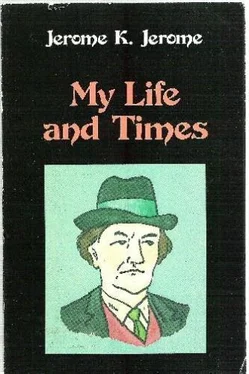In Germany, I gather from German friends, similar thinking prevailed. It was England that, now secretly, now openly, was everywhere opposing a blank wall to German expansion, refusing her a place in the sun, forbidding her the seas, plotting to hem her in.
The pastures were getting used up. The herds were becoming restive.
The only contribution of any value a private citizen can make towards the elucidation of a National upheaval is to record his own sensations.
I heard of our declaration of war against Germany with cheerful satisfaction. The animal in me rejoiced. It was going to be the biggest war in history. I thanked whatever gods there be that they had given it in my time. If I had been anywhere near the age limit I should have enlisted. I can say this with confidence because later, and long after my enthusiasm had worn off, I did manage to get work in quite a dangerous part of the front line. Men all around me were throwing up their jobs, sacrificing their careers. I felt ashamed of myself, sitting in safety at my desk, writing articles encouraging them, at so much a thousand words. Of course, not a soul dreamt the war was going to last more than a few months. Had we known, it might have been another story. But the experts had assured us on that point. Mr. Wells was most emphatic. It was Mr. Wells who proclaimed it a Holy War. I have just been reading again those early letters of his. A Miss Cooper Willis has, a little unkindly, reprinted them. I am glad she did not do the same with contributions of my own. The newspapers had roped in most of us literary gents to write them special articles upon the war. The appalling nonsense we poured out, during those hysterical first weeks, must have made the angels weep, and all the little devils hold their sides with laughter. In justice to myself, I like to remember that I did gently ridicule the “War to end war” stuff and nonsense. I had heard that talk in my babyhood: since when I had lived through one of the bloodiest half centuries in history. War will go down before the gradual growth of reason. The movement has not yet begun.
But I did hate German militarism. I had seen German “offizieren” swaggering three and four abreast along the pavements, sweeping men, women and children into the gutter. (I had seen the same thing in St. Petersburg. But we were not bothering about Russia, just then.) I had seen them, insolent, conceited, over-bearing, in café, theatre and railway car, civilians compelled everywhere to cringe before them, and had longed to slap their faces. In Freiburg, I had seen the agony upon the faces of the young recruits, returning from forced marches under a blazing sun, their bleeding feet protruding from their boots. I had sat upon the blood-splashed bench and watched the Mensur—helpful, no doubt, in making the youngsters fit for “the greatest game of all,” as Kipling calls it. I hated the stupidity, the cruelty of the thing. I thought we were going to free the German people from this Juggernaut of their own creation. And then make friends with them.
At first, there was no hate of the German people. King George himself set the example. He went about the hospitals, shook hands with wounded Hans and Fritz. The Captain of the Emden we applauded, for his gallant exploits against our own ships. Kitchener's despatches admitted the bravery of the enemy. Jokes and courtesies were exchanged between the front trenches. Our civilians, caught by the war in Germany, were well treated. The good feeling was acknowledged, and returned.
Had the war ended with the falling of the leaves—as had been foretold by both the Kaiser and our own Bottomley—we might—who knows?—have realized that dream of a kinder and better world. But the gods, for some purpose of their own, not yet perhaps completed, ordained otherwise. It became necessary to stimulate the common people to prolonged effort. What surer drug than Hate?
The Atrocity stunt was let loose.
A member of the Cabinet had suggested to me that I might go out to America to assist in English propaganda. On the ship, I fell in with an American Deputation returning from Belgium. They had been sent there by the United States Government to report upon the truth—or otherwise—of these stories of German frightfulness. The opinion of the Deputation was that, apart from the abominations common to all warfare, nineteen-twentieths of them would have to be described as “otherwise.”
It was these stories of German atrocities, turned out day by day from Fleet Street, that first caused me to doubt whether this really was a “Holy War.” Against them I had raised my voice, for whatever it might be worth. If I knew and hated the German military machine, so likewise I knew, and could not bring myself to hate, the German people. I had lived among them for years. I knew them to be a homely, kind, good-humoured folk. Cruelty to animals in Germany is almost unknown. Cruelty to woman or child is rarer still. German criminal statistics compare favourably with our own. This attempt to make them out a nation of fiends seemed to me as silly as it was wicked. It was not clean fighting. Of course, I got myself into trouble with the Press; while a select number of ladies and gentlemen did me the honour to send me threatening letters.
The Deputation published their report in America. But it was never allowed to reach England.
America, so far as I could judge, appeared to be mildly pro-French and equally anti-English. Our blockade was causing indignation. In every speech I made in America, the only thing sure of sympathetic response was my reference to the “just and lasting” peace that was to follow. I had been told to make a point of that. A popular cartoon, exhibited in Broadway, pictured the nations of Europe as a yelling mob of mud-bespattered urchins engaged in a meaningless scrimmage; while America, a placid motherly soul, was getting ready a hot bath and bandages. President Wilson, in an interview I had with him, conveyed to me the same idea: that America was saving herself to come in at the end as peace-maker. At a dinner to which I was invited, I met an important group of German business men and bankers. They assured me that Germany had already grasped the fact that she had bitten off more than she could chew, to use their own expression, and would welcome a peace conference, say at Washington. I took their message back with me, but the mere word “conference” seemed to strike terror into every British heart.
It was in the autumn of 1916 that I “got out,” as the saying was. I had been trying to get there for some time. Of course my age, fifty-five, shut all the usual doors against me. I could have joined a company of “veterans” for home defence, and have guarded the Crystal Palace, or helped to man the Thames Embankment; but I wanted to see the real thing. I had offered myself as an entertainer to the Y.M.C.A. I was a capable raconteur and had manufactured, or appropriated, a number of good stories. The Y.M.C.A. had tried me on home hospitals and camps and had approved me. But the War Office would not give its permission. The military gentleman I saw was brief. So far as his information went, half the British Army were making notes for future books. If I merely wanted to be useful, he undertook to find me a job in the Army Clothing Department, close by in Pimlico. I suppose my motives for wanting to go out were of the usual mixed order. I honestly thought I would be doing sound work, helping the Tommies to forget their troubles; and I was not thinking of writing a book. But I confess that curiosity was also driving me. It is human nature to jump out of bed and run a mile merely to see a house on fire. Here was the biggest thing in history taking place within earshot. At Greenwich, when the wind was in the right direction, one could hear the guns. Likewise masculine craving for adventure. Quite conceivably, one might get oneself mixed up with excursions and alarms: come back a hero. Anyhow, it would be a relief to get away, if only for a time, from the hinterland heroes with their shrieking and their cursing. The soldiers would be gentlemen.
Читать дальше










